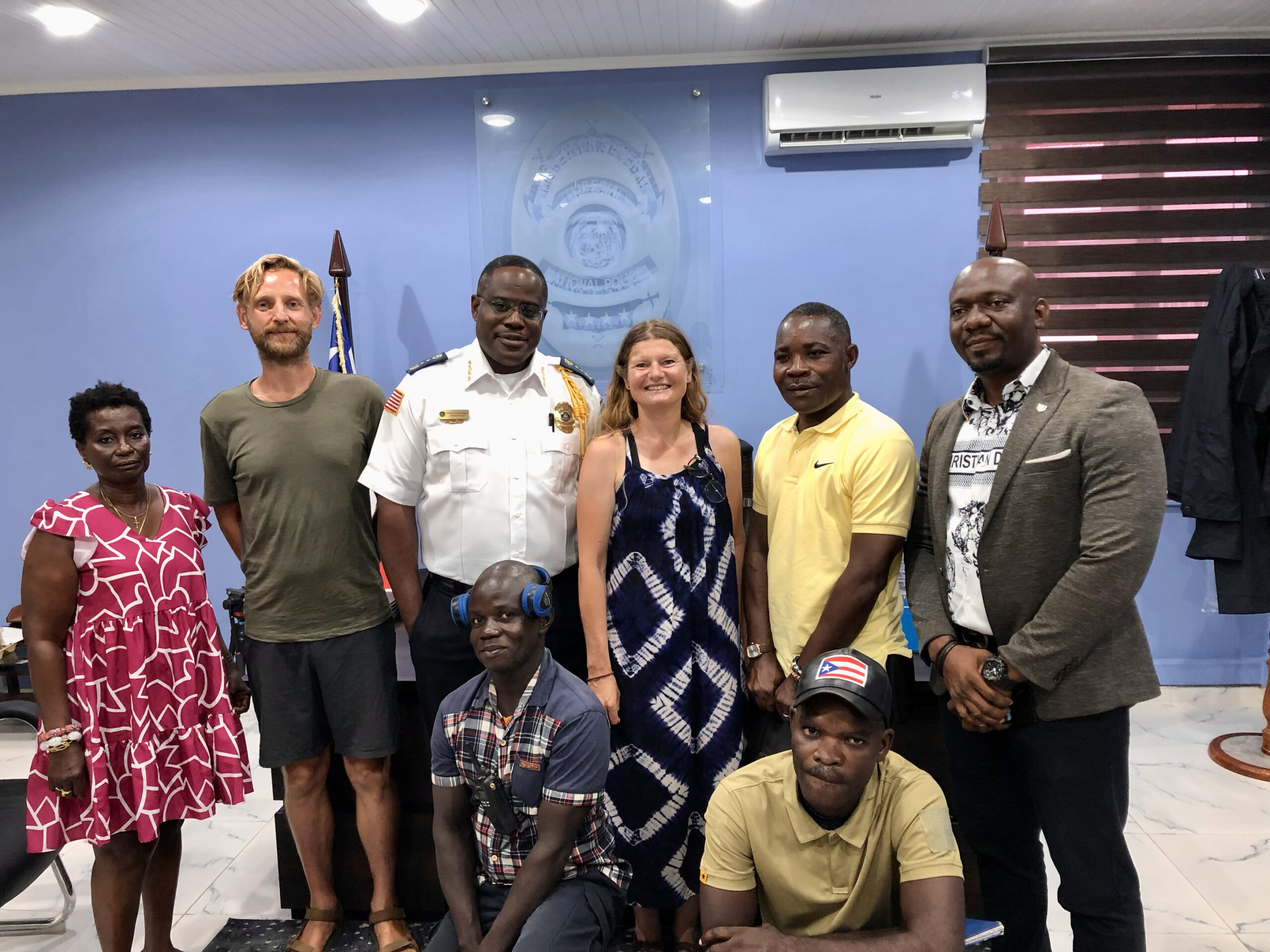This is the story of how our entire journey was turned upside down in a single second. How we were knocked off course for a time. But also about why we can get up again and not least - travel on.
It's true crime in Monrovia, the capital of the world with the most bag thefts.
But we start from the beginning.

Our first impression of Liberia is like entering Paradise.
Having crossed the border from Sierra Leone, we take the first dirt road on the right and wander along the red sandy soil to the end of the road. Along the way we stop in the only small village which has a street kitchen. We get the usual; rice with a sauce made from the leaves of sweet potato, and a dried fish. While we eat, the village chief sits with a group of children and smiles kindly at us. When we are half finished with the portion, we put the plate down for a moment to wipe the red palm oil from our mouths with a napkin. Immediately one of the boys gets up and takes our plate to eat the rest himself. We hardly manage to react, but are very touched to understand how little food there is actually to eat here. The village chief is still smiling at us.

A nice arrival
At the end of the dirt road is a small village on the bank of the river. Under a large mango tree is a wooden bench where we find a couple of women relaxing in the shade. We tell them our desire to find a man with a canoe who can row us across the river to Robertsport. The women call for some children, who are sent off as messengers into the village. After some time in the shade of the mango tree, a man appears. He asks for 30 usd for us and the bikes. We negotiate a bit and end up at 25usd. He smiles widely. The bikes are carried on board and we apply sunscreen, so we are ready for 2 hours of quiet sailing across the estuary.
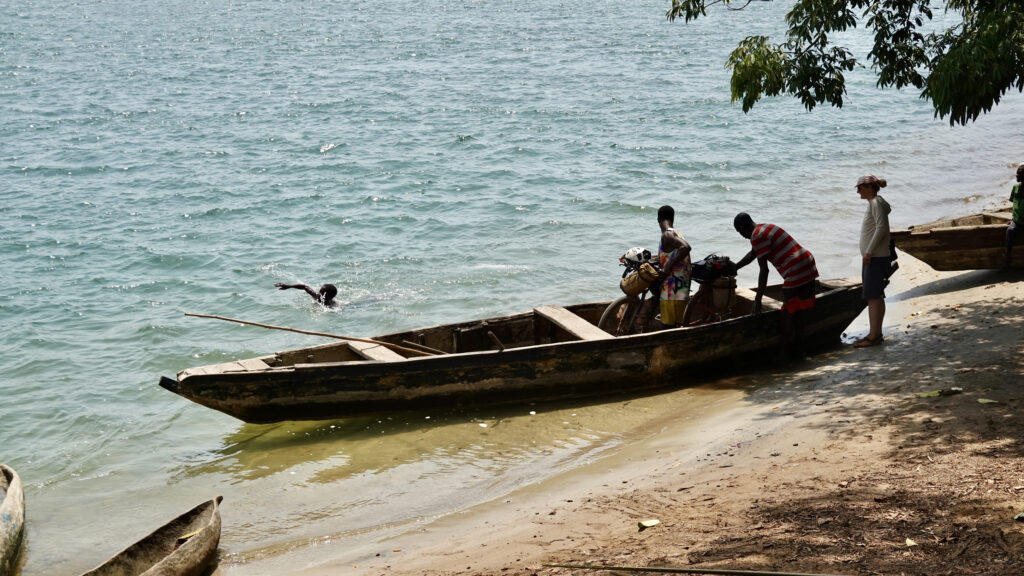

When our small wooden canoe approaches the shores of Robertsport, we carry the bikes ashore and head for Robertsport Surfclub Beach.
Paradise revealed itself to our eyes when we rolled down to the beach where the Surfclub is located between the palm trees, with a small cozy bar and restaurant, as well as 4 pavilions for tent accommodation. The manager Peter welcomed us. Unfortunately, he had rented out the pavilions, but we had to set up the tent down on the beach itself. The sandals were kicked off, we took a dip in the refreshing sea and cracked open a cold beer. The shoulders dropped and calmness spread throughout the mind. There was an incredible atmosphere at the little gem.
We drank the cold beer in the company of Tony and Jad – father and son of Lebanese descent, who live and do business in the capital Monrovia. We spent the afternoon and evening with them, talking about life in Liberia, seen from a new side. So far we have met expats and locals, but Jad and Tony are the first we get to know, who live in Africa, with other origins. Lebanon, India and China in particular have large environments in Africa.
Jad and Tony's family have been here for three generations and they have lived through civil war, ebola and corona and seen how it has changed the country. Nevertheless, they have an incredibly positive outlook on life and focus not much on politics and crises, but on the joys of life. Good company, good food and good hospitality.
The next day we went exploring with them along the beach. A few kilometers from the surf club is a shipwreck that has washed up on the beach. That was the goal of our excursion. We walked in the baking sun and enjoyed one paradisiacal deserted beach after another. We took the time to collect seashells, bathe, eat almonds from the trees, rest in the shade and take in the blue ocean deep. Just be there. It was healing without anything needing to be healed. Pure paradise.
Without talking about deep things, this experience founded our friendship with Jad and Tony. It was interesting how a connection to strangers can unfold without words, but simply by sharing a nice experience.
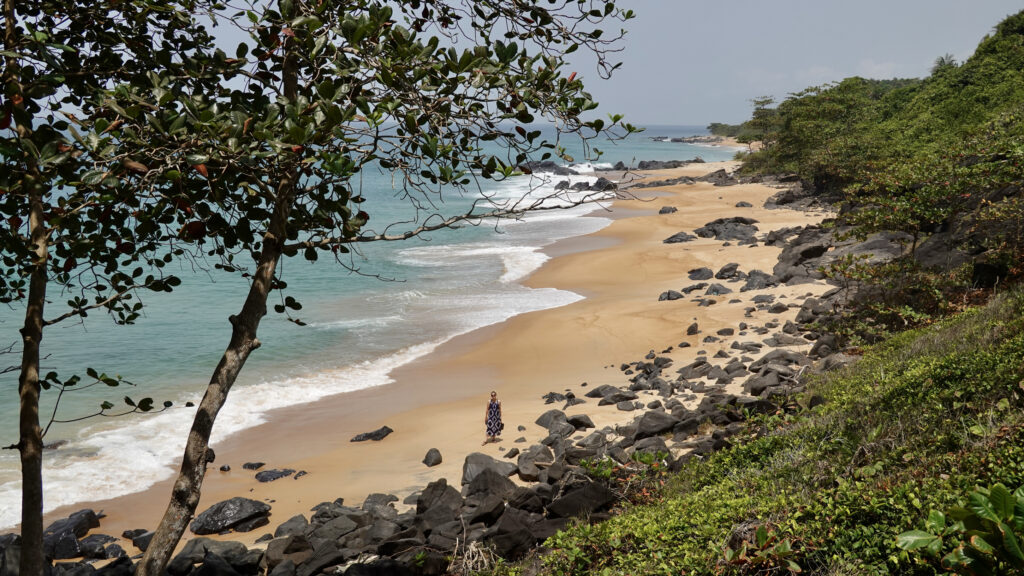
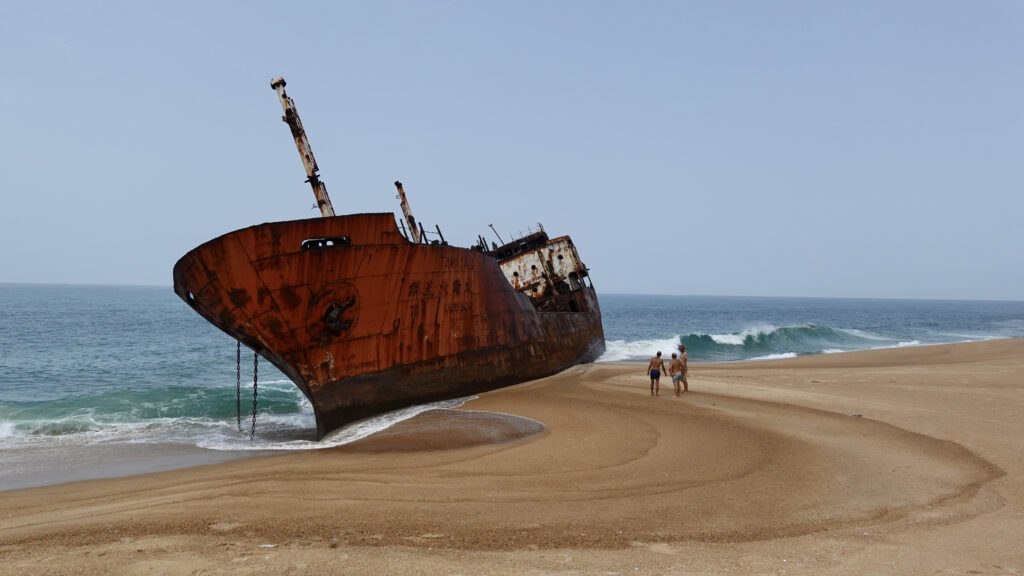
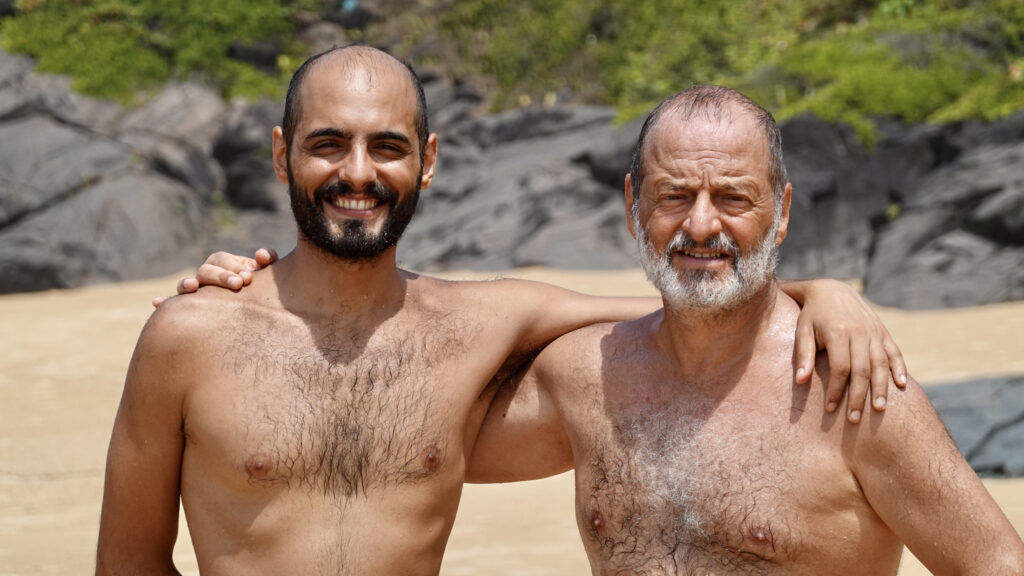
More hospitality
After only two days in Robertsport, we packed our things and reluctantly left paradise to cycle to Monrovia. We had to apply for a visa to Ghana, so we were also forced to stay quiet for a few days in the capital. We divided the 120km into two days, with an overnight stay midway. As evening fell we stopped at a small side road and discussed whether there would be somewhere in the bush to camp. Meanwhile, an elderly man emerged from a house by the road. The man was small in stature, but we could see he was strong from a hard-working life. His eyes were sunken and red, but at the same time warm and calm. His whole radiance enveloped us in security, in the middle of the busy main road.
He asked us what we wanted and we explained that we were looking for a place to sleep. "Come with me. You can sleep at my house.” he said. 5 minutes later, our tent was behind his house, perfectly sheltered from the noise of the country road. Some of the village's curious children had joined. Marie took them by storm when she tried to run with their barrel band. In reality, it was an old bicycle rim that they steer with a stick as they run at full speed down the bumpy path. Neither Kenneth nor Marie succeeded particularly well in this. But we got points for trying.
Then the oldest boy got the idea to try Kenneth's bike. He seemed like a good boy with legs in his nose, so even though he could only sit on the handlebars of the bicycle, he took a triumphant ride around the house, among pots and women, chickens and goats. It went well, so the courage grew, and before we looked around, little brother was climbing onto the back of the bike. After a brief misgiving, Kenneth surrendered to the boys' project and lifted little brother onto the saddle and pushed them into action. There were huge cheers and pride at steering the big, heavily packed bike down the path, with little brother balancing high in the air. And you can't exclude anyone, so the younger sisters should also have their turn.
Only when the oldest boy wanted to ride out on the dark country road and into the village on the bike, "To see their faces", was it time to put a damper on the moods, and the bike was driven back to the cabin.
As darkness fell, we enjoyed ourselves with the family. That night we laid our heads on the pillow, grateful to be invited inside once again by hospitable people as the rain beat down on the tent for the first time in months. Perhaps as a warning of what was to come...
The next morning we got up and got ready.
While brushing our teeth we talked to the man in the house. He showed us his land, he pointed to his cassava, his pineapples and to the burnt land where he wants to grow more crops. It was clear that the family's primary survival comes from the things he grows here for them to eat. On the other hand, there is not a lot of ready money here. This is how many live in Liberia. If people do not grow their own food, it is incredibly difficult to make a living. In that way, the conditions are actually better here than for those who move to the city in search of happiness. Because in the cities the competition is fierce and often people come here without qualifications. That is that many struggle for very low-paying jobs and not all succeed. Therefore, the greatest poverty and the greatest desperation are to be found in the larger cities, such as Monrovia.
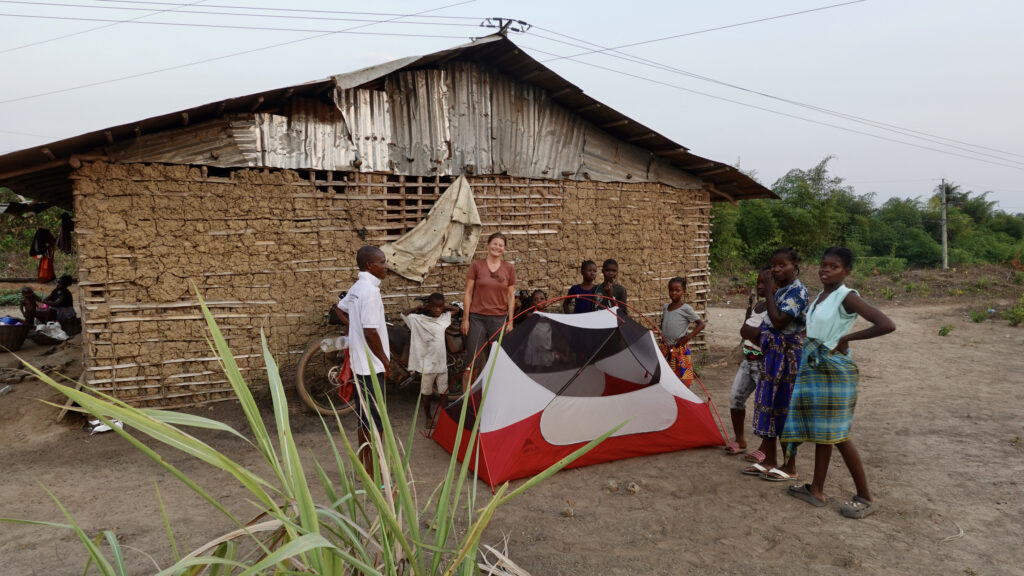
We thanked our host and the children for shelter and good experiences. It was only 50km to Monrovia. We had run out of cash, so it was a matter of keeping the chain tight so we could get in before lunch, withdraw money, and find some food before Kenneth got hangry.
The big city is showing its teeth
The access road to the big city was, as always, a little challenging. Mildly put. But we navigated familiarly between fast motorbikes, three-wheeled tuktuks, battered taxis and huge, expensive four-wheelers.
Everything went well. We approached the center and we soon found an ATM. We each withdrew 250usd and stopped at a supermarket and bought delicious fresh local yogurt for lunch. Then we drove back out onto the two-lane main road, towards Kaldi's coffee shop 800m down the road, where the rumor said good coffee and wifi.
This part of town was much quieter. We were near the embassy quarter and Sunday calmed the traffic. Everything seemed safe, the parades were down and spirits were high. Until Marie suddenly let out a loud scream. A man on a motorcycle swung a big arc around Kenneth, with Marie's bag in his arms. Kenneth shouted oaths and curses as we both kicked the bikes up to top speed in a wild chase for the motorcycle. The thief was deeply professional. He drove up close to the side of Marie, let off the gas, tore the bag from Marie, which she had slung over her shoulder, her hand on the gas again, and at full speed away from the crime scene.
Although we stepped up and had our eyes fixed on the motorcycle, he disappeared slowly but surely, as it dawned on us what we had lost: Marie's passport, phone, camera, visas and approx. NOK 10,000 in cash!
With renewed energy, Kenneth gave it an extra shell, while Marie stopped at some traffic officers to get them to pursue the thief. A kilometer further down the road we had to give up. The man was gone. And so were all of Marie's most valuable things.
We followed the police back to the local police station. Here we were let into a small office by a very taciturn officer in a Mickey Mouse T-shirt and BBQ cap. He was supposed to write our report, but was definitely not in a hurry. He honestly seemed equal parts incompetent and indifferent, but we knew we had to wait to have documentation for the insurance. When he finally finished, we asked for a copy. It turned out to be a bit cumbersome because the printer "didn't work". We hurried to take a picture of the report with Kenneth's phone, as we could feel where it was all starting to go downhill. The famous and infamous African system was closing its clammy claws around us. The system where bureaucratic processes take an infinite amount of time, unless they are lubricated with a few dollar bills here and there. For a start, we agreed to have the report printed tomorrow, and paid nothing.

The trust is gone
Exhausted and cursed, we cycled back towards the city. Suddenly we had completely different glasses on. Usually we smile at everyone. We are used to young men on motorbikes riding past us, their heads turned out of joint, to study us. To be honest, it's probably mostly Marie they find interesting. We've gotten used to that. But now – Now everything was suddenly different. We scowled in disbelief at all the people around us. People who looked at us were immediately judged by our critical looks, in relation to the likelihood that they wanted us to hurt. Or rather, on the assumption that they would actually hurt us if they could get away with it. We radiated the blackest energy with a huge thundercloud hanging over our heads.
We checked in at the Methodist Guesthouse only 500m from the crime scene. A couple of missionaries from the USA lived here. Or i.e. Don is a linguist and works with two locals to "translate the Word of God into local tribal languages". Robert is a retired psychologist who, through the Methodist Church, teaches locals how to deal with drug addicts.
The mood was low and we explained to them why. There were comforting words and great empathy, which warmed a little. But as soon as we calmed down, reality set in, and we had to start making plans for the next days work with the police, embassies, banks, insurance companies, telecommunications companies etc etc.
Bottom record
Monrovia has a boring world record. It is the capital in the world that has the most cases of "petty theft", i.e. bag theft and the like. We didn't know that when we cycled into town. But everyone we spoke to afterwards told us: "It happens all the time". We learned that the locals often wear their bag under their T-shirt and that they always have their bag towards the discount, never towards the road. The neighborhood we live in, which we thought was a safe embassy neighborhood where there are large property complexes for expats, turned out to be plagued by robberies at night, for the same reason. The relatively many and relatively rich white people who cluster together in ghettos attract young men who play Robin Hood and justify to themselves that it is ok to steal from those who have a lot. Therefore, we could not walk or cycle in the evening. When we had to go out, it had to be by car.
We pull on the work clothes
Monday morning we were ready to tackle the many tasks that had to be solved. First stop was to cycle back to the local police station.
The bag hadn't turned up, which didn't surprise us. We had already mentally written it off. However, the police took the task very seriously - in their own way. They still could not give us a report which we felt was all we needed. Instead, they wanted to take us out to the crime scene. Marie was quite adamant in her insistence that nothing sensible would come of seeing a two-lane road where we happened to be cycling when she was robbed. But according to the police's explanation, it was "necessary" to be able to write the report. So we had to jump on the bikes, the officer on a mototaxi, and drive out to the crime scene.
Here we stood and looked at the traffic for a bit, scratched our necks and talked to a few random passers-by. Pretty soon a very upset man came up to us. He looked wild in the eyes and stood waving an empty plastic can in his hand. He shouted a lot in Creole at Kenneth. Creole is almost English, so you understand a little, but far from everything. The man was quite loud and aggressive. The situation escalated as we tried to remain calm. The officer who was with us had no intention of interfering, and the only thing he offered was to tell the man a few times: "Go to the police". The man shouted louder and louder as his red eyes flashed, his gaze fixed on Kenneth. He looked like a desperate and homeless drug addict. We didn't understand what he wanted or what he said, apart from the fact that it suddenly came out quite clearly from his mouth: "I will fuck you up!". Kenneth tried as composedly as possible to talk him down, but it didn't work. Suddenly he turned on his heel and ran away from us as quickly as he had appeared. The officer said: "He is crazy". Jatak – we've got that, but thanks for the help mate police officer.
Now the dutiful officer instead wanted to go down and see Kaldis Kaffebar, which we were on our way to before Marie was robbed and the day changed abruptly. THEN Marie burned down. She was told in an unusually clear way that we would not waste time on that, and that instead we had to go to the Danish consulate to get an emergency passport. It worked as intended and the officer agreed to part ways for now. As a final twist, we just had to pay for his motorbike taxi. THEN Kenneth burned down. With as much clarity as Marie, he was presented with the paradox of having all his money stolen AND having to pay the police money to do their job. It was not a 100% fair interpretation, because it is purely factual that you pay for the police's transport, as they do not have their own vehicles available. But by this time we were getting pretty tired of being dragged around the arena by an inept officer who had his eyes fixed on getting money out of us to write a report we needed for insurance. So a line was drawn in the sand.
While we stood and spoke in capital letters, quite a few locals had gradually gathered around us, who followed the steps. Other motorcyclists, a couple of guards from a nearby hotel, and curious pedestrians. Again, Liberia showed its beautiful side, a young man stepped out from the crowd, he had heard the whole rumor that we had had our money stolen and said: “I understand you. I'll probably have to pay for the mototaxi. Do not worry." Maybe it sounds childish, but there was actually a stone that fell from the heart, because the biggest loss we risked here was not the money, but the trust in other people on a foreign continent. And here was a man who again extended a hand and showed empathy and humanity. So even though it was only a few dollars, he repaired a significant hole in our hearts.
Extreme poverty gives extreme living conditions
Inequality in Liberia is huge. Approximately half of the population lives below the extreme poverty line. Various organizations work to lift people out of poverty. But it goes incredibly slowly. The programs have been running for more than 10 years, but the numbers change only marginally, and it is still half of the population who live in extreme poverty, which means they manage on less than DKK 15 a day.
More than half cannot read and write either. But that is not the biggest problem, because Liberia is largely a manufacturing country that needs strong hands. And here lies the real problem, because the low-wage jobs are incredibly poorly paid. Even if you have a job, it is very difficult to support your family. Therefore, as mentioned earlier, people must supplement their income by growing their own food.
Therefore, you can understand people who go to the capital in the hope of finding jobs that can support them. But the traps are many, and Monrovia has a huge problem with drugs. Many young people start taking a drug called kush. It has a high lethality but also high addiction. But worst of all, it creates an even greater desperation for money in the already pressured metropolis.
At the same time, we see many large four-wheel drive vehicles with tinted windows driving around Monrovia. Many rich people who drive to the expensive hotels to sit in air conditioning and eat lunch and drink coffee at European prices. Outside, we see desperate people standing with an outstretched hand through the bars of the fence, which must keep them away from the rich. In the parking lot in front of a cafe, we saw security guards arguing loudly with a group of men who thought they had the right to beg in front of the cafe. The security guards wanted them gone. People in the cafe looked the other way.
Visiting the consul
From the scene of the crime, we cycled out to the other end of the city to visit the Danish consul. He is a businessman and we found his business address. We were let in through the massive iron gate by friendly guards, parked our bikes in the shade and entered the air-conditioned office. We were shown to a couple of good chairs in front of a nice desk. Here sat the consul's closest employee, who in a calm but regretful voice could inform us that the consul just went on a 3-week holiday yesterday! Another slap in the face!
The employee stated that the emergency passports are locked in the consul's office, with no possibility for others to issue them. We did the math quickly in our heads. Did we really have to stay 3 weeks in Liberia to wait for the consul?
The employee called the consul, who luckily was just halfway in Paris. Marie was allowed to talk to him. He was a really pleasant man. But his best bet was to contact the Danish embassy in Ghana to see if they can help.
Marie got hold of the ambassador in Ghana. Long story short, we were referred to the Swedish embassy in Monrovia, who may be able to issue a "Laissez-Passer", a document that will allow Marie to leave the country, but only with the option to fly home to Denmark. Another belly puffer. This will mean a huge break in our trip. And a not inconsiderable financial burden began to loom before us.
However, the Danish consul had an ace up his sleeve. The ace is called Mamawah Sheriff and is a local woman who works for the consul. She is used to working with the police and making things happen. The consul asked us to contact her and it was arranged that we should cycle directly to police headquarters where she would meet us.

The consul's rambuk
Outside the police station, a small but mature African woman in a big beautiful dress met us: Mamawah Sheriff. She is a powerwoman who speaks Creole in a cool mix of unequivocal commands and uplifting sermons. The right cocktail to kick off the police's efforts. Marie agreed to go into the police headquarters, while Kenneth looked after the bicycles outside. The waiting time in front of the station was spent sending messages to the friends we have in Monrovia. Jad and Tony are key figures in the city's Lebanese community, and they sent out feelers and messages to their network that the bag should be found and returned. So did Randy, a local architect whom we met at the border post a few days ago. Both reported back that there is a good opportunity to get back the things that cannot be used or traded; passport and phone.
Inside the police station, Marie felt like she was in an American police series and got the same message: "We will get your bag back!" We had a hard time believing it, but we began to understand that the criminal community would be interested in selling the bag back. It was only a matter of price.
Mamawah Sheriff knew exactly who to grease and how much. Bosses were involved, skilled officers were allocated and the report was written. Money was still needed, but this time it felt like the work was going somewhere good.
At the same time, the local officer from the other station called Kenneth again and again and said we should come back so they could write more of a report. We approached them and asked if they had found the bag.
We tried to gamble on as many horses as possible and to make the earth burn a little under the thieves, so that they wanted to get rid of the bag as soon as possible.

Upset Christians
When we got back to our Methodist Guesthouse, Don and his local colleagues were sitting in the common room working on their translation of God's Word. One colleague was unapproachable and radiated anger. We quickly discovered that his anger was about the bad reputation that Liberia gets from such a situation as we experienced. We had a good chat and assured him that we have more good than bad experiences in Liberia and that we are incredibly grateful for the support we have received. He loosened up a bit and said that he had already written to the ministry urging them to pay our loss of cash! We're sure it won't happen, but his concern for both us and the country's reputation was touching.
Don is an incredibly nice man, with whom we later had many good conversations. But at this point we barely knew him. Nevertheless, he looked into Marie's eyes with his kind look and said: "My congregation and I are praying for you and for you to get your bag back".
Who knows what helps the most in such a situation?
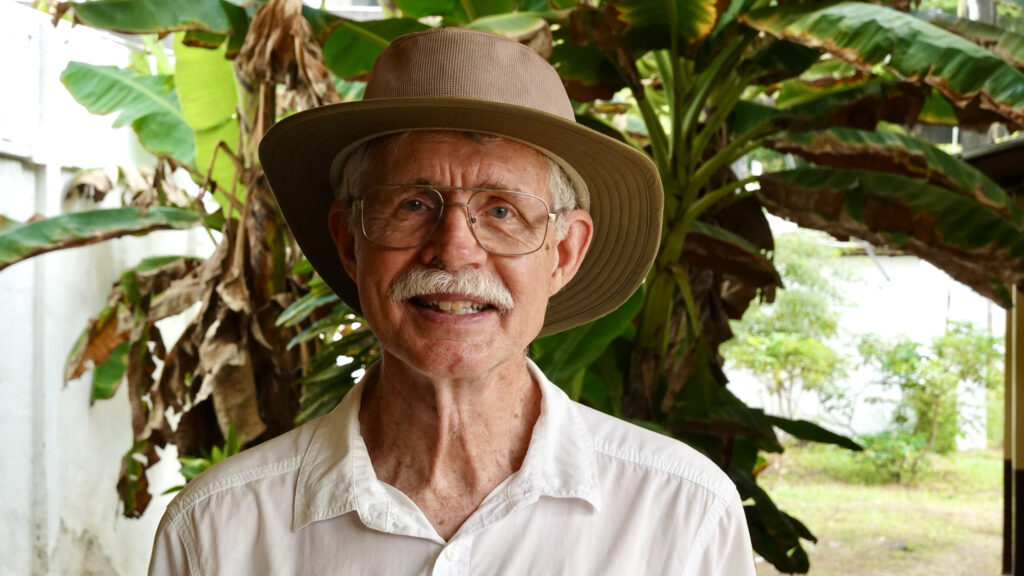
A new hope
We sat at the front of the Roller Coaster of Emotions and drove at full speed between peaks and valleys, between hope and helplessness, anger and gratitude.
That same evening, Jad and Tony invited us to dinner at their beach house. On the terrace with a view of the sea and the sunset, and with a glass of cool wine in hand, we could gradually laugh at the grotesque situation and our shoulders fell a little again in the good company. After all, it was only dead things in the bag, and we were thankful that nothing serious had happened, that no one was hurt. From here, there are just a lot of practical tasks to solve, and we got renewed energy to deal with the police, embassies, insurance companies, etc.
Jad drove us home to our Guesthouse through the dark capital. Out there somewhere, there was probably a bunch of young men firing it up for a wild party, for our money.
At home at our guesthouse, Marie checked her email, on Kenneth's phone: "Your phone is located near Carey street". The phone had been in airplane mode, but someone was clearly trying to open it now. The pulse increased and we rushed to take a screenshot and send it to Mamawah Sheriff, Jad and Randy. Maybe someone could find the phone and thus the thief tonight?
Our lives peak
The next morning we had agreed to meet with the Mamawah Sheriff at police headquarters. In typical African style, she did not appear. She also did not respond to messages or pick up the phone when we called. Not even if we had confirmed the agreement an hour before. We stood close to the entrance and were engrossed in planning how we could proceed from here. Either we could wait for the consul to come back so we could get an emergency passport which could possibly get us to the Ivory Coast. Or we could cycle a bit around Liberia together before Marie had to fly home on a "Laissez-Passer". But since all the other visas in the passport also had to be done again before Marie could continue on the journey, the best, but saddest, plan was probably for Marie to fly home immediately and get her credit card sorted, passport , visas, vaccination cards, etc., etc. In addition to the 10,000 kroner in various currencies, which was in the bag in cash, as well as 20,000 kroner in valuables, tied up in camera, phone, sunglasses, etc., we began to realize that the cost of all securities would add up for around DKK 5-10,000, plus plane tickets home and back. All in all, a loss of perhaps DKK 50,000 in round numbers. It hit us hard, but there was nothing else we could do but roll up our sleeves and get down to business. The first step on the way was to get the police report handed over, which was behind a "paywall" of bribes, so that we could contact the insurance!
As we stood debating, a quirky man with headphones perched askew on top of his head walked past us and nodded. We nodded back. There was something strangely familiar about that man. Kenneth looked after him again, and made eye contact again. With a loud shout, Kenneth ran after the man and grabbed him tightly by the shoulder. He was carrying Marie's bag!!!! It is super easy to recognize because of its red strap and unique design. Kenneth had a good grip on him and was about to shake when the ten fell - the man was one of the officers working on the case. HE HAD FOUND THE BAG!!
It is indescribable how we jumped and jumped for joy as we followed him into the police station. Tears stood in the corner of my eyes, but they were tears of joy. Relief washed over us, though we could hardly believe what was happening.

Inside the officers' office, they took it a little cooler than we did. We were super excited when the officer opened the bag and emptied its contents onto the table. Marie immediately reached for her passport and kissed it. And then the phone, which she held against her cheek. Credit cards, vaccination cards were there, as well as other small things. Unbelievable!!! Simply incredible. Of course there was no cash. And the battery bank and sunglasses were also missing. They had even snatched the phone cover. But think for a second, getting a passport, phone and even our camera with tens of thousands of photos from the last six months.

We wrote to the Mamawah Sheriff again. And this time she answered immediately. "I'm on the way! Don't do anything until I'm there!”.
And then there were bilateral meetings and grand politics in it. The bosses got involved. The bag was retained and taken to another location. The officers held meetings outside in the hallway. Mamawah Sheriff took us aside and said the officers had to be paid "a little". 100 usd in total!
We were taken into the boss's office. A friendly man who wanted to make sure that everything was ok and that we had a good impression of the police. But it wasn't enough, because immediately afterwards he took us to an empty office. Us, the Mamawah Sheriff and the officers, as well as their bosses, lined up in front of the large desk in the empty office. "He's coming in through that door" was whispered. People moved and made room. We thought "What is going on here???". The door opened and a large man in a white police uniform walked silently through the room and sat down behind the desk. He moved some papers aside before saying in an authoritative voice, without looking at anyone: "Yes?". One of the bosses stepped forward and began to explain: "Two days ago..., thanks to the great efforts of the officers..., we can proudly say we have located the bag and returned it to the owner...". A very formal presentation of the case with a focus on praising the police work.
The Chief Constable took over and spoke to us, as well as the officers. He used the occasion to tell how the police work intensely and deliberately to raise the level of investigations, and that he was happy to see this work pay off in this specific case. Marie finished with a speech about how grateful she was, how skilled she thinks the officers are, and how good an impression we have of Liberia in general.
And then the boss said: "I know you're documenting your trip, are you interested in taking a picture?"
Yes please!
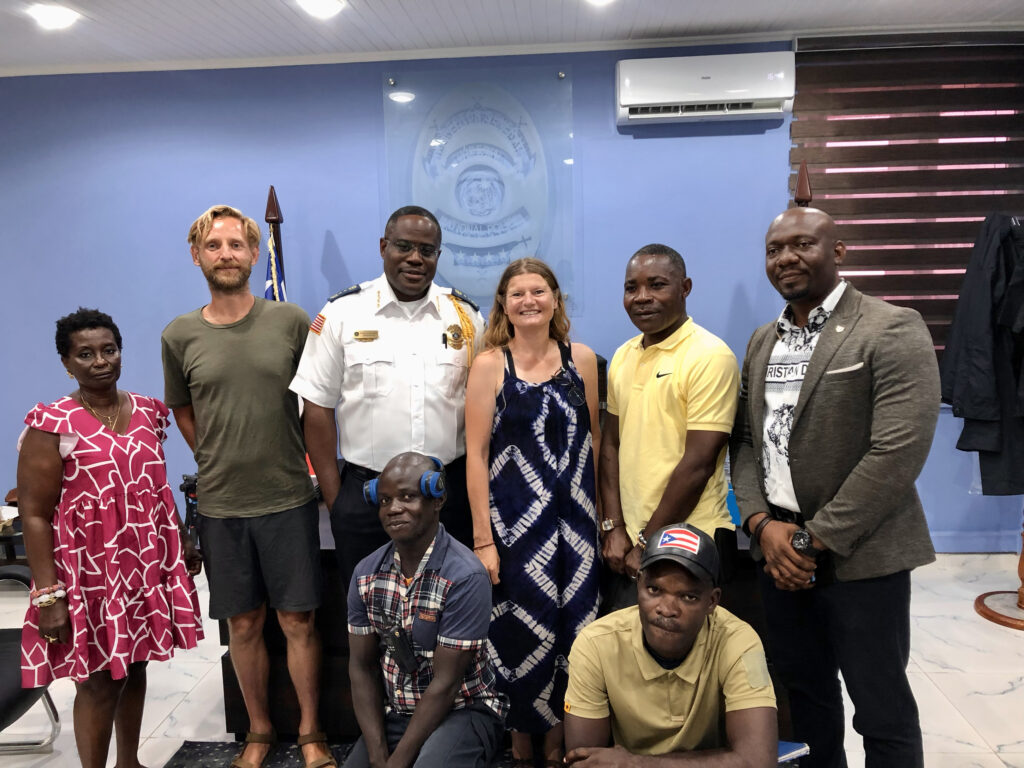
All that remained was to sign the report and have it delivered. We enter a new office, where an officer is sitting watching an American police series on his computer. He looks up and exclaims: "I told you we would get it back!".
The mood is high and everyone smiles with relief. The report is signed and a copy is given to Marie. Mamawah Sheriff pulls us out into the hallway and asks for the 100usd, which she will divide fairly among the officers. This is the first time we have paid corruption money in Africa. It cuts us to the heart. No doubt the Mamawah Sheriff has pushed the investigation, and 100 usd is a small price after all to get the bag back. But no officers ever asked for the money and for our travel budget it is a considerable sum.
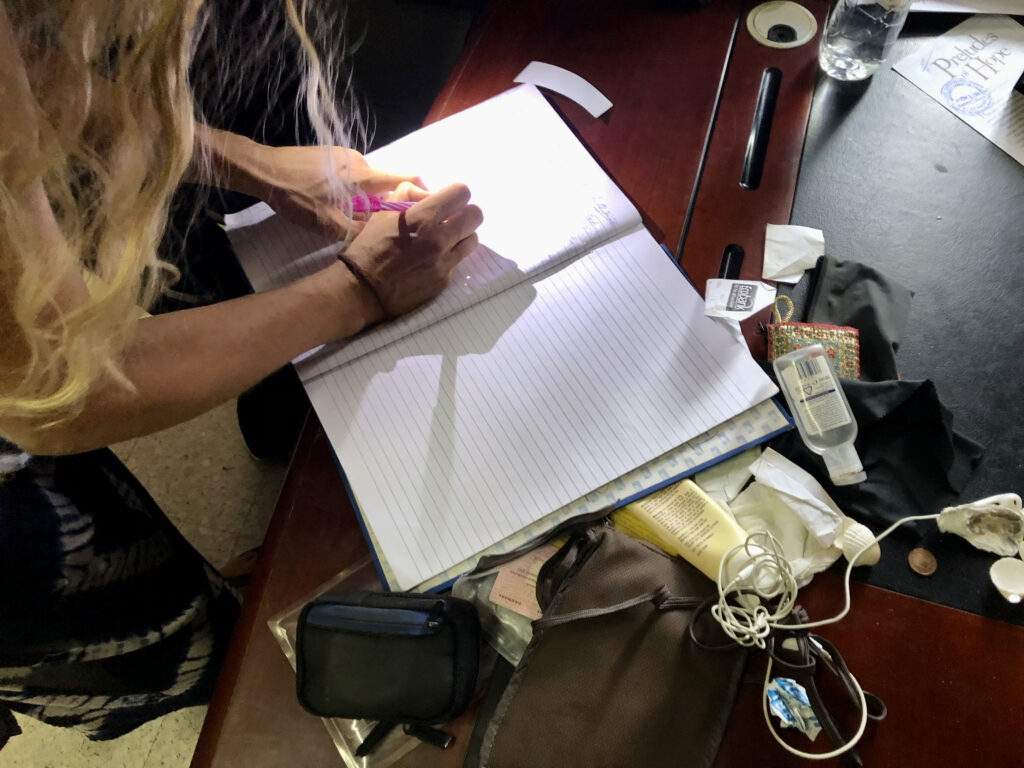

A nice ending
The next day we go for a walk in the swamp area, on the outskirts of the city, among the houses where ordinary people live. The houses are built of tin around small dirt paths. Clotheslines go criss-cross. The chickens run in the streets. There is no electricity or sanitation here. Joseph stops us and asks what we are doing. We say we want to experience how ordinary people live. Joseph is wearing a pair of old shoes and a torn T-shirt. Just like us. He says that he works for the government in the correctional facility. He lives here in the slum, which is actually quite nice. As we talk together, people smile at us and say hello. We can feel the last negative feelings and distrustful looks at people leaving us, and we stand again with energy and faith in the best in people, as we return their heartwarming smiles.
Joseph thanks us for the visit and ends by saying the phrase we have heard most from people in Liberia: “You are welcome!”


